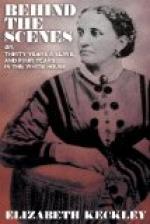cotton patches, oat fields and underbrush, not daring
to take the main road. This is why we were so
wet. Uncle Alfred traveled wholly by the stars—they
were his guide. He knew by looking at them the
four cardinal points of the compass. Many old
slaves were guided in this way when traveling in the
night, and some could tell the time of night by the
position of the stars. We stayed in Hicke-Halley
all day, and in the evening, when it was dark enough,
we started on again, Uncle Alfred offering up a prayer
to God to guide us safely through. Cold Water
was our next stopping place, and here a difficulty
rose before us that made us fearful. We had nothing
to wear but what we had on, and not much of that, so
had small space for carrying anything, and, therefore,
had brought with us only a little bite to eat.
As we had lived on this small provision for a day,
there was now but little left for our increasing wants;
and the difficulty of securing anything from the houses
without danger of detection was almost insurmountable.
But we felt encouraged as we thought of what we were
striving for, and sped on our way. But the way
was hard, for sometimes we got completely stuck in
brier patches, and had to turn and go back, in order
to find a way out. Old logs and driftwood, that
had been piled up year after year, were other obstacles
in our way; and one can imagine how hard it was to
make our way through such a mass of brush and forest
by the dim light of the stars as they struggled through
the dense branches of the trees. We stumbled on,
however, as best we could, each fearful, yet silently
praying for guidance and help. When within four
or five miles of Cold Water, Uncle Alfred stopped,
and cautioned us not to speak above a whisper, as the
rebel troops were camped on both sides of us.
We were in a swamp between the two roads, gradually
working our way through to the river, as we could
not go on either of the roads for fear of detection.
At the bridges, where these roads crossed the river,
there were rebel camps, and it was useless for us
to think of crossing either. We, therefore, worked
our way carefully through the thicket that we were
in until we came within sight of the river. Then
Uncle Alfred went ahead, creeping a few steps, then
stopping to see if the river was clear of soldiers.
From this point it was some two and a half miles to
the bridges, each way; and it was our idea that if
we could cross here without being seen by the soldiers,
we would be all right. Uncle Alfred came back
to us and told us that he thought the way was clear.
“I can not hear a sound,” said he, “so
let us go on.” We followed the river down
until we came to a place where we could cross.
Here we found some drift-wood—an old tree
had been blown down, nearly across the river, leaving
a space of about twenty feet. Over this natural
bridge we crept to the open space which we waded,
the water being up to our knees; but we did not mind
this. There was no talking above a whisper, for




